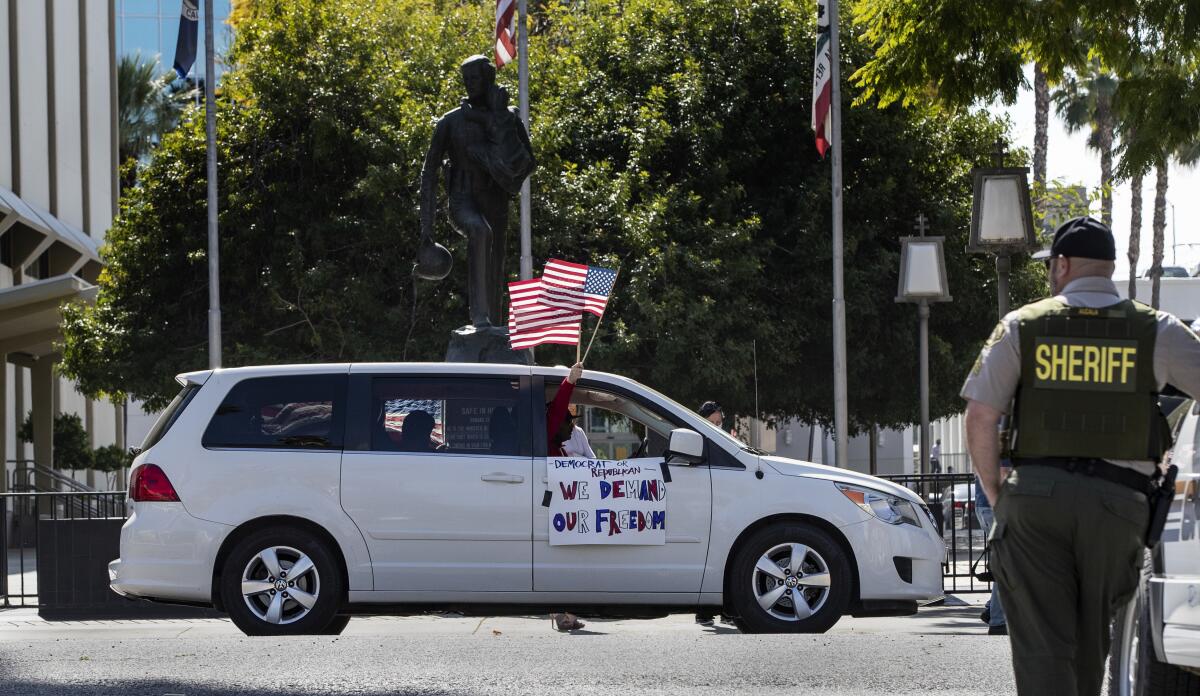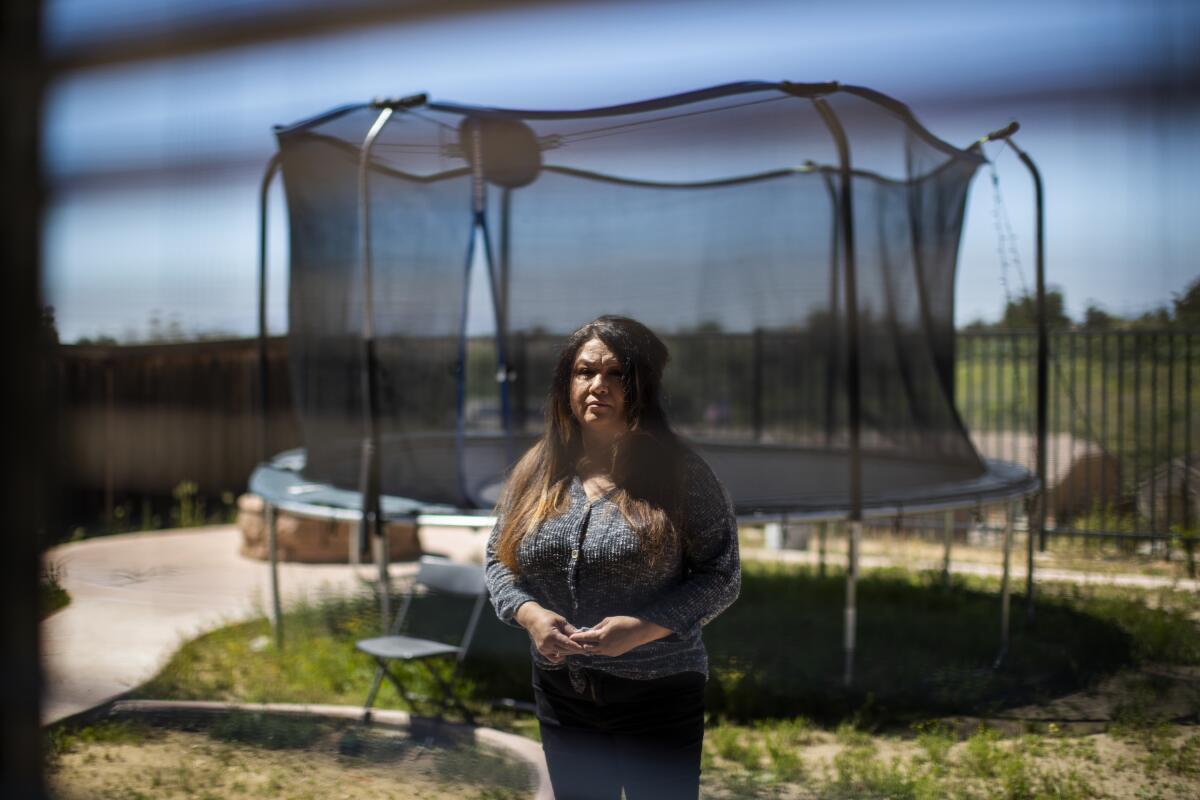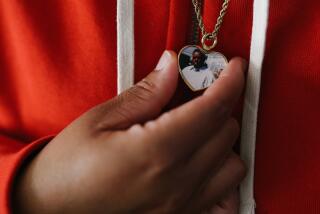Fateful choices as coronavirus raged through Riverside jail, hitting deputies and inmates

For two weeks in early March, Riverside County Sheriff’s Deputy Terrell Young routinely drove inmates, one at a time, from the Cois M. Byrd Detention Facility in Murrieta to a hospital for medical appointments.
During those trips he was exposed to several people, including inmates and a nurse, who would later test positive for the coronavirus infection.
When Young reported to work on March 22, he felt ill and realized he had a fever. Early in his shift, he notified a supervisor and went home. But by then, he and others probably had been spreading the virus — without knowing — for days.
Less than two weeks later, Young died at age 52.
Now, the agency is grappling with one of the largest jail outbreaks of COVID-19 in the state. The latest figures show some 136 inmates and 71 Sheriff’s Department employees have been infected. Many have recovered, but a second deputy and now an inmate have died.
Early on, Sheriff Chad Bianco said he would not let inmates out early because of the disease.
“I feel very strongly that the inmates we have remaining in custody pose a much greater risk to public safety than the risk this virus poses to them while they are in custody,” he said.
But civil rights advocates have described the agency’s efforts to protect people who live and work in the jails as woefully inadequate. Inmates said they feared their jail terms could turn into death sentences. Deputies worry about bringing the virus home to their families. A federal judge found that the Sheriff’s Department “failed to demonstrate that it is currently taking adequate precautions” to protect those in custody and ordered officials to submit a plan to achieve physical distancing.
“The sheriff is really, as far as I know, standing alone in refusing to reduce the jail population at all,” said Sara Norman, an attorney with the Prison Law Office, who sued over jail conditions. “L.A., not enough, again, but they are taking steps. Only in Riverside has the sheriff said: Nope.”
The nation’s overcrowded jails and prisons have become hotbeds of infection, spreading among inmates and staff.
At Cook County Jail in Chicago, more than 460 inmates and 360 sheriff’s employees have tested positive. Nearly half have recovered, but six inmates and one correctional officer have died.
At Rikers Island and other jails in New York City, roughly 378 prisoners are infected and three have died.
In California prisons, 178 people have tested positive and one has died.
To combat the spread, authorities have sped up the release of some lower-level offenders and those with medical conditions.
Los Angeles County, which typically houses about 17,000 inmates, had just 11,866 inmates in custody. Since the pandemic began, 71 L.A. County jail inmates and 61 Sheriff’s Department employees have tested positive. A nursing staff member who worked in the jails died.
But Bianco has generally spurned the broad release orders adopted in other agencies. In a court filing, the department said it already was releasing low-level offenders to ease overcrowding, including those who would otherwise qualify for compassionate release or who are at high risk of contracting the virus. It’s unclear what criteria it uses for those releases.
The latest maps and charts on the spread of COVID-19 in California.
“There is no such thing as a low-level inmate in our custody. We don’t hold them anyway,” Bianco said during a news briefing this month. “If you don’t wanna catch this virus while you’re in custody, don’t break the law.”

Lisa Matus, who has two sons in the Larry D. Smith Correctional Facility in Banning awaiting trials, said she was blown away by that statement.
“Who makes him a judge now?” she asked. “You’re supposed to house and protect them, and your staff.”
Bianco compared jail cells with an apartment, saying there’s no social distancing inside a person’s bedroom. The number of inmates allowed in dayrooms at one time, though, has been limited, he said.
“To say that inmates have to have their own room while they come to jail and everything else, it isn’t going to happen,” he told The Times in an interview. “You don’t get your own room when you go to your apartment or your house. They’ve chosen this as their home.”
The Sheriff’s Department refused to provide a breakdown of coronavirus cases at the jails it runs.
Bianco previously said authorities traced the first cluster of COVID-19 cases to one of Young’s hospital transports the week of March 16. It’s unclear where the exposure originated. But employees who worked overtime shifts in the jail may have become infected during that time and spread the virus around the department, he said.
The day after Young went home early, nine co-workers called out sick with flu-like symptoms. One of them recovered after 14 days on a ventilator. Doctors at first didn’t think he would make it, Bianco said.
On April 2, a week after learning he had COVID-19, the disease caused by the coronavirus, Young was dead.
Within 24 hours, another deputy, David Werksman, 51, also died from complications of the virus.
Bianco said that Werksman, who spent 11 years on the bomb squad, may have contracted the virus at a funeral. He said none of Werksman’s colleagues in the administrative office where he was assigned was symptomatic at the time.
But Werksman’s older brother, Harry, doubts the sheriff’s claim.
Few attended their 88-year-old mother’s March 20 funeral — David and another brother, a rabbi and a few funeral home employees. The details were worked out well in advance, he said, and the service concluded within five minutes.
Harry Werksman said he didn’t go because of the county’s coronavirus lockdown. But he spoke to his brother while he drove home that weekend.
David told him he felt run down, but Harry attributed the fatigue to the stress of his recent loss. When David began coughing and losing his voice, he went to the hospital and was sent home with the flu.
“He was short of breath. He was coughing. And I was like, ‘You sound terrible. Are you sure you’re OK?’” Harry Werksman said. “And again he reiterated, ‘Yeah, I got the flu.’ And I said OK.”
That was the last time they spoke. He found out later that his brother was hospitalized March 29 and died four days later.
The deaths of the two deputies in such quick succession shocked co-workers.
“You’re fighting an invisible beast and nobody knows where it’s at; nobody knows how it’s going to strike or anything like that,” said Bill Young, president of the Riverside Sheriffs’ Assn.
At the time, Bianco said he believed a majority of employees who tested positive for the virus were somehow linked to one of Young’s hospital transports.
In the days before Young fell ill, Willie Meadows, 56, said he and other inmates were “packed like sardines” onto a bus and taken from Cois M. Byrd to Larry D. Smith. None of them wore masks or gloves.
Within 48 hours, Meadows said he felt sick. He lost his appetite and had trouble swallowing. It was hard to breathe. During phone conversations, Meadows sounded like he was underwater, his fiancee, Marita Person, said.
By April 1, he had a fever of 99.6 and his housing unit was on lockdown, according to medical documents provided by his family. The next day, he was swabbed for COVID-19.
Four days later, the records show, his test came back positive. It’s unclear when he was infected or whether his exposure was related to Young.
According to Meadows and Person, the rest of his 20-bed pod also was infected. At first, there were 15 inmates housed there, and at some point, deputies added seven more, with two people sleeping on floor beds. Meadows said he was recovering.
“As close to death as I wanna get,” Meadows said.
The Sheriff’s Department declined to answer questions about Meadows’ account “due to privacy for the inmate.”
On Sunday, an inmate who had been housed at the same jail as Meadows died of complications related to the virus. The inmate, who was not identified but had been in custody since August 2018, came down with flu-like symptoms on April 13 and tested positive the next day, the Sheriff’s Department said. Six days later, his symptoms worsened and he was taken to a hospital.
Bianco has yet to release the court-ordered jail safety plan. Norman suggested moving inmates to the new jail in Indio that currently sits empty, but the Sheriff’s Department said the facility was not ready to house people. Bianco said he hoped it would be ready in the next couple of months.
Deputies are arresting fewer people — new bookings into jail have dropped to about 50 a day from 100, and about 3,230 people are in custody in the jails, which have the capacity to hold about 3,700, Bianco said.
But he said broader actions were unwise. The California Judicial Council implemented a temporary zero-bail policy for misdemeanors and lower-level felonies to reduce jail populations, which the Sheriff’s Department said it was complying with. Bianco, though, has called the policy “extremely reckless” and says it could result in the release of hundreds of inmates.
“The truth is, our jail population is at historically low levels and we have more than enough space to isolate and quarantine infected inmates,” he said previously. “The truth is these inmates receive excellent treatment and have greater access to medical care more readily than most of you who are not in jail.”
Activists and relatives of inmates recently held a car rally calling on Bianco to release inmates who can’t afford bail. They said it’s impossible to physically distance in a crammed dorm behind bars or to practice safe hygiene without sufficient cleaning supplies. Some taped posters to their hoods and doors.
“Where is my dad and how is he doin?” one read.
“Jails + COVID-19 = Death Chambers,” said another.
Some accounts from inmates and civil rights advocates about unsafe jail conditions are at odds with Bianco’s statements. He said inmates received “all of the cleaning supplies they could possibly want” and that they were “actually sick of us making them clean.”
“If they say they don’t feel good, they get isolated. If they say they have a stomachache, they get isolated. If they say something just doesn’t feel right, they need to see a nurse, they get isolated,” Bianco said. “We monitor them for a period of time, if they start to develop any type of symptoms, they’re tested.”
Frank Cooper, 43, was set to be released from San Bernardino County jail on April 16. His wife, Jackie, had rearranged the metal shack on their property so that he could quarantine for 14 days before coming home. But he never showed up.
She found out later that Cooper was transferred to Riverside County jail on a warrant in an unrelated grand theft case.
Cooper told The Times that he was placed in a holding cell for three days with no soap and the same mask he’d brought from the San Bernardino lockup. He then was moved to a dorm where he said bunks were a foot-and-a-half apart and 25 inmates shared three small bars of soap a day.
He tore up his bathroom towel so he could have a rag to wipe down his bunk and the phones. Two people were removed from his unit in three days, he said, because they had fevers or were sick. Other inmates were ordered to pack up the sick inmates’ belongings and leave them by the door.
Cooper refused to touch the items, he said, noting that he has high blood pressure and is prediabetic.
“If I get it, I might not make it through,” he said.
In a Facebook message to Bianco, Jackie Cooper pointed to her husband’s medical conditions and pleaded for his early release. The sheriff responded: Frank Cooper will be allowed to spend the remainder of his term — his release was scheduled in November — on house arrest, with an ankle bracelet.
Bianco warned of the consequences for violating those terms.
“There are no ‘second chances,’” he wrote.
More to Read
Sign up for Essential California
The most important California stories and recommendations in your inbox every morning.
You may occasionally receive promotional content from the Los Angeles Times.














